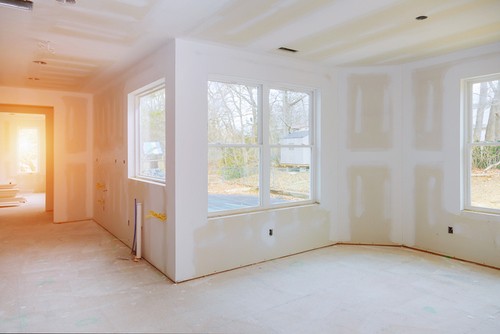How Much Does It Cost to Install Drywall?
Whether you call it drywall, gypsum board, or sheetrock, drywall is one of the most important parts of interior construction. This innovative wall building material is primarily made of a gypsum core with a paper covering. It is used to create finished interior walls and ceilings faster and more easily than the older methods involving plaster. Drywall can be finished in various ways and comes in several sizes, thicknesses, and subtypes for use in multiple areas. For this reason, drywall installation has a range of associated costs.
The national average cost to install drywall is between $1,600 and $3,500, with most homeowners spending around $2,000 on 1,000 sq.ft. of standard ½” drywall, hung and finished in a remodel. At the low end, you can install 500 sq.ft. of ½” finished standard drywall in an addition for $800. On the high end, you can install 1,000 sq.ft. of ½” finished soundproof drywall in a remodel for $7,500.
Drywall Installation Cost
| Drywall Installation Prices | |
|---|---|
| National average cost | $2,000 |
| Average range | $1,600-$3,500 |
| Low-end | $800 |
| High-end | $7,500 |
In this guide
Drywall Installation Cost by Type
Drywall Cost by Size
Sheetrock Prices by Thickness
Labor Cost to Install Drywall
Labor Cost to Hang and Finish Drywall
Cost to Texture Drywall
Cost to Hang Drywall by Location
Drywall Replacement Cost
Cost to Replace Wood Paneling With Drywall
Cost to Replace Plaster With Drywall
Drywall vs Plaster
Drop Ceiling Cost vs Drywall
Enhancement and Improvement Costs
Additional Considerations
FAQs
Drywall Installation Cost by Project Range
Drywall Cost per Square Foot
Drywall 1 has a range of installation costs, depending mostly on the type and job size. Most installers charge less per square foot for entire house sheetrock 1 installations than for small installations. The cost of the material and installation averages $1.50 to $3.50 a sq.ft. for most jobs, but you can use more costly materials that increase the project cost. Some jobs may have lower costs if it is not finished, such as in some garages or basements. Below is the average cost to install it in several wall and room sizes to estimate your project cost.

| Square Feet | Average Cost (Materials Only) | Average Cost (Installed) |
|---|---|---|
| 50 sq.ft. | $25 - $37.50 | $75 - $175 |
| 100 sq.ft. | $50 - $75 | $150 - $350 |
| 200 sq.ft. | $100 - $150 | $300 - $700 |
| 500 sq.ft. | $250 - $375 | $750 - $1,750 |
| 1,000 sq.ft. | $500 - $750 | $1,500 - $3,500 |
| 2,000 sq.ft. | $1,000 - $1,500 | $3,000 - $7,000 |
Drywall Installation Cost by Type
There are many types. In most applications, standard or traditional sheetrock is used unless otherwise specified. However, when installing it in a basement, bathroom, or other wet area, you may want a different type. If you are installing it in a commercial building or apartment building to meet codes, you may need a different type. The exact type differs by your personal preference, room type, and building codes in your area.

| Type | Cost per Sq.Ft. (Material Only) | Cost per Sq.Ft. (Installed) |
|---|---|---|
| Traditional / Standard | $0.42 - $0.50 | $1.50 - $2.50 |
| Plaster Blue Board | $0.46 - $0.58 | $1.55 - $2.55 |
| Fire-Rated (Type X) | $0.50 - $0.88 | $1.60 - $3.50 |
| Moisture-Resistant (Green) | $0.54 - $0.63 | $1.65 - $2.75 |
| Moisture-and-Mold-Resistant (Purple) | $0.54 - $0.63 | $1.65 - $2.75 |
| Eco-Friendly | $0.58 - $0.83 | $1.70 - $3.50 |
| Paperless | $0.63 - $0.92 | $1.75 - $4 |
| Soundproof | $2.08 - $3.15 | $3.55 - $7.50 |
Standard Drywall
Standard drywall costs $1.50 to $2.50 a sq.ft. installed. The material averages between $0.42 and $0.50 a sq.ft. This is the material most people have installed in their homes. This material makes up most interior walls and ceilings. It has a gypsum core and paper covering. It is fast and easy to hang and has a flat surface that makes most finishes easy to achieve. It is also the least expensive. Unless you have specific needs for a room that requires another type, this is likely what you will have installed.
Plaster Blue Board Cost
The cost of blue board is $1.55 to $2.55 a sq.ft. installed. The cost of the material is $0.46 to $0.58 a sq.ft. While this is not technically a type of sheetrock, blue board or plasterboard is sometimes used in place of drywall. While sheetrock can be finished in various ways, it is not ideal for the heavier plaster and Venetian plaster 2 finishes that complement some homes. When opting for a traditional plaster finish on your walls, you need blue board instead of the traditional one. This material is sometimes called plaster base, plaster baseboard, or plaster blue board.
Fire-Rated Drywall Cost
The cost of fire-rated drywall is $1.60 to $3.50 a sq.ft. installed. The cost of the material averages $0.50 to $0.88 a sq.ft. There are certain areas within a home and in many high-occupancy buildings like apartments and dormitories that require the use of flame-resistant and flame-retardant materials. For the indoor walls, this means using fire-rated type, sometimes known as Type X. Many types can also be fire-rated. Look for the “X” in the description to see if the type is in this category. This type is made of non-combustible fibers like fiberglass 3. This material is harder to cut and work with than other types, so it is not usually used unless required.
Moisture-Resistant Drywall Cost
The cost of moisture-resistant sheetrcok is $1.65 to $2.75 a sq.ft. installed. THe cost of the material is $0.54 to $0.63 a sq.ft. Sometimes known as “green board,” this moisture-resistant type has a special coating to prevent moisture absorption. This is often used in bathrooms, basements, and other areas with high moisture. Some green board types are ideal for use with tile in areas like kitchen or bathroom backsplashes 4 or the bathroom walls outside of the shower. The material is usually easy to work with and installs like regular drywall.
Moisture-and-Mold-Resistant Drywall Cost
The cost of mold-and-moisture-resistant drywall is $1.65 to $2.75 a sq.ft. installed. The cost of the material is $0.54 to $0.63 a sq.ft. If you need extra protection against moisture and potential mold growth, you want it “purple”. This type has a coating to prevent moisture absorption, like green board, but it also inhibits mold growth. Purple board usually offers superior performance against moisture as well, so if you have had issues with mold in the past, purple board may be the better choice. Sometimes, the coating on purple board is not as flat as the standard and green board, making it more difficult to finish.
Eco-Friendly Drywall
The cost of eco-friendly sheetrock is $1.70 to $3.50 a sq.ft. installed. The cost of the material is $0.58 to $0.83 a sq.ft. The vast majority is considered eco-friendly and sustainable. That is because most type is made from gypsum, which is a highly recyclable material. Most types contain some recycled content. However, if you want to ensure that the one you are using contains the most post-consumer material for higher sustainability, look for brands that sell eco-friendly or “recycled” sheetrock.
Paperless Drywall Cost
The cost of paperless drywall is $1.75 to $4 a sq.ft. installed. The cost of this material is $0.63 to $0.92 a sq.ft. Traditional sheetrock is covered with a layer of paper over the gypsum core. The paperless type has the same core with a fiberglass exterior instead of paper. This exterior makes it moisture and mold-resistant and stronger and more durable. It can be more difficult to cut and install than traditional sheetrock. It is also more difficult to finish because the texture is not as smooth. These two attributes mean that it can be more expensive to install than other types. It costs between $15 and $22 a sheet on average.
Soundproof Drywall Cost
The cost of soundproof drywall installed is $3.55 to $7.50 a sq.ft. The cost of the material is $2.08 to $3.15 a sq.ft. If you want to make your walls soundproof, it is possible to install one that absorbs and deadens sound. This type is laminated, or made in layers with a mixture of wood pulp and polymers along with the gypsum. This makes it incredibly dense so that sound does not pass through it as easily. It is very difficult to cut and install and costs much more per sheet than other types. For this reason, it is usually used only in areas where sound control is very important.
Drywall Cost by Size
Drywall comes in a few standard sizes. It is the easiest to work with in the 4’x8’ size, so this is the size most often used by installers unless a larger size is required. For ceilings and rooms with high ceilings, there are also 4’x12’ and 4’x16’ sheets available, but this is much less common. Regardless of the size, your costs per square foot are likely similar for the project. Below are the average costs of the three sizes and the cost to install them.

| Size | Average Cost per Sheet (Material Only) | Average Cost per Sheet (Installed) |
|---|---|---|
| 4’ x 8’ | $10 - $15 | $48 - $80 |
| 4’ x 12’ | $12 - $18 | $72 - $120 |
| 4’ x 16’ | $16 - $25 | $96 - $160 |
4’ x 8’ Drywall Price
The price to install a piece of 4’ x 8’ drywall is $48 to $80. The price of the material averages $10 to $15 a sheet. This is the most common size, readily available in all types. It is the easiest to handle and the least expensive to buy and install. If you plan on tackling a DIY sheetrock project, this is also the size that you want to work with. Oversized sheets require special handling, while this size does not.
4’ x 12’ Drywall Price
The cost to install a piece of 4’ x 12’ drywall is $72 to $120. The price of the material is $12 to $18 a sheet. This size is most commonly used for ceilings. It may also be used in rooms with higher-than-average ceiling heights. This is because the longer pieces make it easier to complete the wall without a lot of cuts. This sheetrock size starts to become difficult to handle, however, so it is not recommended for DIY. At this size, your installation costs also increase slightly because the sheets are heavier and harder to move.
4’ x 16’ Drywall Price
The cost to install a 4’ x 16’ sheet of drywall averages $96 to $160. The cost of the material is $16 to $25 a sheet. This size is the least common of the three sizes. It is used for oversized rooms and ceilings. This sheetrock size may have to be thicker than average to accommodate the height without risking breakage. It is also heavier and more difficult to handle. Installing this size costs more due to the difficulties in handling it.
Sheetrock Prices by Thickness
Drywall comes in thicknesses ranging from ¼” to ⅝”, with ½” being the most popular. The sheet thickness is usually tied to the type and overall size. Not all thicknesses are right for every project. Sometimes, building codes dictate the sheetrock thickness.
The most common sheetrock thickness used in wall and ceiling applications is ½”. Water-resistant sheetrock of the same thickness is used in bathrooms. Thicker options, often ⅝” fire-resistant drywall, is used in garages and furnace rooms.

| Thickness | Average Costs per Sheet (Material Only) | Average Costs per Sheet (Installed) |
|---|---|---|
| ¼” | $10 - $12 | $48 - $75 |
| ⅜” | $10 - $15 | $48 - $80 |
| ½” | $10 - $20 | $48 - $100 |
| ⅝” | $13 - $75 | $51 - $240 |
¼” Drywall Cost
¼” sheets of drywall typically cost $48 to $75 to install. The material costs $10 to $12 a sheet. The ¼” sheets are typically used for repairs in existing walls and ceilings. They can also thicken a wall or ceiling by overlaying the thinner material over the existing sheets. In some instances, ¼” sheetrock may also be used for ceilings. This thickness is also easier to bend, so it is most commonly used to create curved walls.
⅜” Drywall Cost
⅜” sheets of drywall average $48 to $80 to install. The price of the material is $10 to $15 a sheet. It is one of the least common thicknesses. This is slightly under ½”. It is not quite thin enough to overlay other sheets. While it can be used to create curves, it must be dampened first. The most common use is in specific areas where ⅛” makes the difference in spaces meeting one another. For example, when remodeling and framing a new wall that is slightly too close to an adjoining wall, ⅜” sheetrock fills the space more easily.
½” Drywall Cost
½” drywall sheets cost $48 to $100 to install. The price of the material is $10 to $20 a sheet. ½” sheetrock is by far the most common thickness. Most types come in this thickness, including standard, green, purple, and eco-friendly. At ½”, the material is sturdy enough to cover most load-bearing walls 5 without issue. If needed, it can still be installed around a curve when dampened first, and it is not too bulky for use on ceilings. For most applications, this thickness works unless otherwise specified by building codes.
⅝” Drywall Cost
⅝” sheetrock costs $51 to $240 a sheet to install. The sheets cost $13 to $75 each. ⅝” sheetrock is slightly thicker than ½”. This is the thickness that 4’x12’ sheets are most likely to have for added structural stability. This thickness is also common on fire-resistant and soundproof drywalls because of the added thickness. This also means the material becomes heavier and more difficult to cut and work with. For this reason, unless it is required for code or requested for soundproofing, it is not common to use this sheetrock thickness.
Labor Cost to Install Drywall
A carpenter or contractor can install sheetrock for you, and it will likely involve a team of at least two people because sheets can be heavy and unwieldy. The total price per square foot to install drywall is $1.15 to $3 in labor for most standard and moisture-resistant drywalls, with the variation coming primarily from the job size and finish level. Large jobs have lower costs overall per square foot than smaller jobs, which may have higher costs per square foot than this average range.
If you are remodeling, your old wall will need to be removed first, which can also increase costs. This can add another $0.50 a square foot to the project for the removal and disposal of the old sheetrock, and any necessary repairs.
Installation is broken down into steps. Each step has a general cost breakdown range, so the cost to hang it may be separate from the cost to mud and tape drywall, depending on how your contractor prices it out. In general, the cost breakdown for installation includes:

| Installation Stage | Cost of Labor (per sq.ft.) |
|---|---|
| Hanging Drywall | $0.15 - $0.65 |
| Taping and Mudding | $0.40 - $0.70 |
| Sanding and Priming | $0.10 - $0.50 |
| Finishing | $0.50 - $1.15 |
| Total Labor Costs | $1.15 - $3 |
With the cost of material, the total cost range to install drywall is between $1.50 and $3.50 a sq.ft., depending on the job type and size.
Sheetrock can be installed both vertically and horizontally. Vertically is the most common installation, particularly in homes with 8-foot ceilings. Some installations call for a horizontal application, which can be easier to tape. There is no cost difference between the two.
Framing and Drywall Cost
Your drywall needs to be installed on the wall frame or the studs. The wall needs to be framed with this in mind. Because it is usually installed vertically, this means that each piece is 4-feet across. Most stud walls for drywall are framed every 16 inches, which allows you to attach the sheetrock in three places - each edge and the centerline. An interior stud wall frame costs around $9 to $16 a sq.ft. installed. It costs between $1.50 and $3.50 fully installed and finished, making the cost to frame and drywall an area like an addition between $10.50 and $19.50 a sq.ft. total.
Labor Cost to Hang and Finish Drywall
There are six levels of finishing when it comes to sheetrock installation. The first few levels are simply parts of the total installation, while the last few levels are designed for getting it ready for painting or decorative textures. The following costs are what the labor costs are to install the sheetrock to each of the various finish levels. There is a great degree of overlap, depending on the job size and type.

| Finish | Average Costs per Square Foot (Labor Only) |
|---|---|
| Level 0 | $0.30 - $0.80 |
| Level 1 | $0.70 - $1.50 |
| Level 2 | $0.80 - $1.75 |
| Level 3 | $0.90 - $2.50 |
| Level 4 | $1- $3 |
| Level 5 | $1.15 - $3.50 |
Level 0 Drywall Finish
The price to hang the drywall and not finish it is $0.30 to $0.80 a sq.ft. for labor. Level 0 means that your sheetrock is completely unfinished. It has been hung but not taped and mudded 6, primed, or finished in any way. It is simply screwed to the studs. This is most commonly used for temporary walls when remodeling a part of your home, and you need a temporary wall to block it off from your living area. It is not meant for long-term use.
Level 1 Drywall Finish
The price to hang the drywall to level 1 is $0.70 to $1.50 per sq.ft., depending on the job size. At level 1, it has been taped and mudded, but it does not have any joint compound 6. Only the seams 7 are done, and it is common to see ridges and tool marks. This is a tighter finish, but it is still not meant to be seen. This is how your sheetrock may be hung in an unfinished attic space. You can always go back and finish it later, but in this state, it is a good partition for rooms.
Level 2 Drywall Finish
The price for a level 2 finish is between $0.80 and $1.75 per sq.ft. for labor. For areas that will have a layer of flat paint or a layer of primer 8 and nothing else, such as the inside of a garage or utility closet, a level 2 finish is usually fine. The walls are hung, taped and mudded, and usually skimmed with joint compound. They are not likely to be sanded 9, however, so they often show tool marks, ridges, and other imperfections.
Level 3 Drywall Finish Cost
A level 3 finish averages $0.90 to $2.50 a sq.ft. in labor. When you plan to have your walls done in a decorative texture that is heavily applied or this is a workspace that you do not want nicely finished, a level 3 finish can work. This type is completely covered in a joint compound, which has been lightly sanded. It may be primed if you are not planning on texturing, or it can be unprimed if you will apply a textured finish later. This is usually the bare minimum finish used in residential areas.
Level 4 Drywall Finish Cost
Expect to pay $1 to $3 in labor for a level 4 finish. If you are using flat paint or having a thinner, lighter finish applied, a level 4 finish is usually the best choice. This finish has minor surface imperfections, but it has been smoothed and sanded. If you are not texturing, it will be primed and possibly painted with a single coat. This is also a good texture if you are unsure of what you will do with the area but know that you will do something, such as if you think you may tile or wallpaper that space.
Level 5 Drywall Finish Cost
To hang and finish drywall to level 5 costs between $1.15 and $3.50 a sq.ft. in labor for most jobs. Most interior rooms within a home have a level 5 finish. This finish has a thin layer of joint compound over the entire surface. It has been thoroughly sanded, primed, and maybe painted. This is the level of finish when you just want to paint the walls. This finish works for even very glossy paints because it is smooth with no ridges or potential imperfections.

Cost to Texture Drywall
Your drywall can be given many textures and finishes to change and enhance its appearance. The texture can be applied in two ways - by hand or spraying it onto the wall. There are several textures within the two methods that you can achieve.
The most common method of finishing sheetrock is to sand and ready it for painting. However, ceilings and some walls may benefit from added texture. Light and sprayed textures typically cost $0.50 to $1 a sq.ft. to apply. However, a heavier texture costs an additional $1.50 to $2 a sq.ft.
You can achieve many textures, such as the hawk and trowel, which is the least common. More common varieties include the Santa Fe, which is popular in the South and Southwest because it appears close to stucco, and the skip trowel, another popular finish in the Southwest.
In the Midwest, the most popular finish is the stomp knockdown, which uses the trowel to apply heavy amounts of texture before knocking some away. The swirl texture is primarily used on ceilings, while the rosebud texture may be used in more traditional settings.
Spray textures include the orange peel and a lighter version of the knockdown texture. Both are more common if you plan on painting the walls and want some texture to show, while the hand-applied textures are for more decorative purposes.

Cost to Hang Drywall by Location
Drywall is least expensive when you cover the entire home at one time. Large areas tend to be less expensive per square foot than smaller areas. For some smaller rooms, installers charge by the sheet rather than by the square foot. Costs are around $120 to $130 a sheet for most single rooms, fully installed. Below are the average costs to install it and finish various rooms, based on their average sizes.

| Location | Average Costs (Labor Included) |
|---|---|
| Bathroom | $430 - $500 |
| Living Room Ceiling | $600 - $700 |
| Bedroom | $675 - $725 |
| Garage | $700 - $750 |
| Living Room Walls | $960 - $2,800 |
| Basement | $1,380 - $1,500 |
Cost to Drywall a Bathroom
The average cost to drywall a bathroom is around $430 to $500, depending on the size and use. Installing it in a bathroom has a range of costs, depending on the type of bathroom and what you intend to do with it. For example, a half bathroom that will be painted has different costs than a master bathroom that will have tile on most of the walls. In most bathrooms, you need green or purple sheetrock to inhibit mold and prevent moisture problems. If the walls will be tiled, your costs are lower than if they will be painted.
Cost to Drywall a Ceiling
The average cost to drywall a living room ceiling is around $600 to $700 fully finished. Installing it in a ceiling can be less than the cost to install it in the perimeter walls of the same room. For example, a living room has an average size of 300 sq.ft. This means that the ceiling size is 300 sq.ft., but you may have two 10-foot walls and two 30-foot walls that are 8 to 10-feet high. So, the cost to install it in the ceiling is usually lower than the cost to install it in all the walls of the room.
Cost to Drywall a Bedroom
The average cost range to drywall a bedroom is $675 to $725, depending on the finish. Costs to install it in a bedroom must take into account the square footage of each individual wall. Costs for only installing it in a bedroom, which are generally smaller rooms, will be higher per square foot than when installing it in several rooms at a time. In most cases, the bedroom walls will be fully finished, and you will likely use standard sheetrock.
Cost to Drywall a Garage
The average cost to drywall a two-car garage is around $700 to $750. Sheetrock in a garage is often left mostly unfinished, with just a bare skim coat of joint compound. This makes the cost per square foot significantly lower than the cost to drywall a room on the interior of the home. While garages are larger than some rooms, they are often less expensive to drywall in general because they usually do not need specialty materials or have high finishing costs.
Cost to Drywall a Room
The average cost to drywall each wall in a room of around 300 sq.ft. is $960 to $2,800. Installing sheetrock in a room means taking the measurements of each wall. For the average living room of 300 square feet, this may mean two 10-foot walls and two 30-foot walls, for a total square wall footage of 640 to 800 sq.ft. on average. While standard drywall is typically used in this space, the level of finish is usually the highest.
Cost to Drywall a Basement
The average cost to install drywall in a basement is around $1,380 to $1,500. Installing it in a basement has a wide range of costs. The ceilings are generally low, making the wall square footage slightly lower than in other interior rooms. And the walls may not be finished to the same degree as the rest of the house. However, you may want to install either green or purple sheetrock, which has a higher cost per square foot for the material. Your installation and finishing costs will likely be lower.
Drywall Replacement Cost
The cost to replace drywall is only slightly higher than the costs to install new sheetrock. This assumes there are no major structural changes and nothing is discovered once the walls are opened that need to be changed or fixed. In this case, the old sheetrock can usually be removed for around $0.50 to $1 per sq.ft. for removal and disposal. The costs to install and finish the new drywall are the same as installing in a new home - $1.50 to $3.50 a sq.ft., for a total cost of $2 to $4.50 a sq.ft. to replace the sheetrock in a home.
Your costs could be higher if things are discovered behind the drywall that make it impossible to install the new material. This could include insect or rodent activity, wood rot or damage, or mold and mildew. If any of these are present, the issue must be addressed before the new one can be put up, increasing costs.

Cost to Replace Wood Paneling With Drywall
If you currently have wood paneling, it is possible to remove it and replace it with drywall. The biggest issue is that there are many kinds of wood paneling. Thin wood veneer 10 is fairly easy to remove and dispose of, while a thicker hardwood panel is more difficult to work with. While the cost to install drywall is between $1.50 and $3.50 a sq.ft., the cost to remove wood paneling and install or replace any framing behind it can be as high as $30 a sq.ft. For the average 300 sq.ft. living room, this can cost as much as $20,000 for the total job for hardwood paneling. Thinner veneer may only cost $5 a sq.ft. for removal and disposal, making total costs closer to $4,000 for the total job.
Cost to Replace Plaster With Drywall
Replacing plaster with drywall is often done in older homes. Although it changes the value of a historic home, many people opt for drywall if you need to make repairs or open the walls because sheetrock is faster, easier, and less expensive to replace than plaster. Consider your choices before taking this step. Plaster has some distinct advantages over drywall, including durability and lifespan. Also, plaster contains lime that is naturally resistant to mold. The presence of asbestos 11 should certainly be investigated before removing plaster to install drywall. The cost to remove plaster walls is $2.10 to $3.20, with an additional cost of $1.50 to $3.50 per sq.ft. to add the sheetrock.
Drywall vs Plaster
Drywall is the most common method of creating interior walls. It is fast, easy, and inexpensive to put up. Plaster is more time-consuming, consisting of a mixture of gypsum dust that is made into a paste. It is applied in three separate coats onto a wood lath. This creates a different texture and a cooler-feeling wall to the touch. It is also much stronger and more durable than drywall.
Plaster takes longer to apply, and you need to find a specialist to apply it. Because drywall can go up so quickly and does not require special skills, it has become the preferred choice of many contractors and builders. However, plaster can give you longer-lasting and more durable results.
Both can be finished differently, but it is more common to finish plaster with more decorative textures than drywall. Both materials can also be painted when finished to complete their look. Of the two, plaster tends to cost more to install.
Below are the average costs to create 1,000 sq.ft. of walls using both methods.

| Wall Material | Average Costs (Installed) |
|---|---|
| Drywall | $1,600 - $3,500 |
| Plaster | $4,500 - $5,500 |
Drop Ceiling Cost vs Drywall
You can create a ceiling in many ways. In spaces that do not currently have a ceiling, including new construction, attics, and basements, your most common methods are the drop ceiling and a drywall ceiling. In a drop ceiling - also known as an acoustic ceiling 12 - the ceiling is made of tiles suspended in a metal frame. This gives you access to utilities installed above the ceiling and eliminates the need for a frame. This is beneficial in basements.
A drywall ceiling has a frame like your stud walls. This frame is covered in drywall and finished with a compound and painted. This is the most common method of creating a ceiling in finished rooms. It is often higher than a drop ceiling but does not give access to the area above like a drop ceiling.
The drop ceiling is less expensive to install if you install a ceiling in a basement with no frame. Below are the average costs of installing both types, including their requisite frames or suspension materials in a 130 sq.ft. space.

| Ceiling Type | Average Costs (Installed) |
|---|---|
| Drop | $955 - $1,510 |
| Drywall | $2,405 - $3,055 |
Enhancement and Improvement Costs
Drywall Painting
When the wall is finished to the level you desire, you can have it painted. The average cost to paint a room is $990 to $1,320. If the finish level is lower with more visible seams, the paint may not hide them entirely.
Demolition
In the case of replacement, the old wall needs to be removed, taking care to avoid electrical and plumbing components. Wall demolition costs around $1,200 to $5,000 for the average wall. Costs can be higher or lower, depending on the wall and its placement.
Drywall Insulation Cost
When installing new drywall, you can insulate at the same time. This is cheaper than insulating after the sheetrock is installed. The average cost of insulating open walls is $0.65 to $6.50 a sq.ft., depending on the insulation type.
Ceiling Installation
Drywall can also be installed on the ceiling. There may not be an additional cost in many cases, but if your ceiling is particularly high like cathedral and vaulted ceilings, it may come with a 10%-30% upcharge.
Removing Old Drywall
If there is pre-existing drywall, the old wall must be removed. This usually has a cost of $0.50 to $1 a sq.ft. for removal and disposal. Costs vary depending on the sheetrock condition and how much is being removed.
Additional Considerations and Costs
- DIY. Drywall can be installed DIY. Ensure you have the proper measurements and materials before beginning.
- Cover ceiling. You can cover an existing ceiling with drywall instead of removing the old ceiling. This installation is easier when left to a professional crew. The cost varies depending on how tall your ceilings are. Keep in mind that this can lower the height of the finished ceiling.
- Demolition. Removing old walls can be potentially hazardous. If your home is older, have your walls tested for things like lead paint and asbestos before you begin.
- Repairs. Replacing drywall opens your walls and exposes what is behind them. This is a good time to make necessary repairs to pipes, wires, or other structures.
- Permits. Permits may be required for this project. Speak to your contractor or local municipality for more information.
- Estimates. Ensure estimates you receive give you the full scope of the work, including materials, labor, and cleanup.
- Hiring. If you hire someone for this job, ensure they are a professional and affiliated with the AWCI. Always get references and interview at least three candidates for the job.
FAQs
- Should drywall be hung vertically or horizontally?
This is largely based on the job. In most cases, the drywall is hung vertically with studs placed every 16”, allowing for good contact. However, both orientations can work.
- How much does drywall cost per sheet?
This depends on the type. Standard drywall costs around $10 to $25 a sheet, but specialty types can be as much as $75 a sheet.
- How long does it take to put up drywall?
This depends largely on the project size. A small room could be completely drywalled in a day. An entire home may take a few weeks. Sheetrock is hung in many steps, and while it can be screwed down quickly, taping, mudding, and finishing take time.
- How much does it cost to frame and drywall a room?
The cost varies depending on the room size, but the average cost to frame and drywall a room ranges from $10.50 to $19.50 per sq.ft.
- How much more does level 5 drywall cost?
A level 5 finish means few, if any, visible seams and a uniform finish, meaning that it is ready to paint. Level 5 drywall costs $1.15 to $3.50 per sq.ft., depending on the type.
- How many sheets of drywall do I need for 1,000 square feet?
When using standard 4’x8’ sheets, you need approximately 32 sheets, but you may want to add one or two for error.
- How much drywall is needed for a 2,000 sq.ft. house?
A 2,000 sq.ft. home needs a wide variation in the amount of drywall, depending on several factors. An open floor plan requires less drywall than a home cut into many rooms. The ceiling height also impacts the amount of drywall needed. Which ceiling type and whether you have any paneling, such as cement backer board or wood paneling, also impact the amount of drywall. You may need anywhere from 6,000 sq.ft to 9,000 sq.ft. of drywall to complete the interior.
Remodeling Terms Cheat Sheet
Definitions in laymen's terms, cost considerations, pictures and things you need to know.See full cheat sheet.
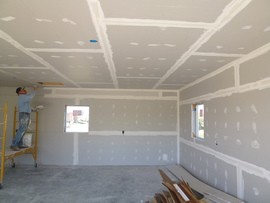 1 Drywall: (Also known as Sheetrock) Type of plasterboard, commonly used to build walls and ceilings, composed of gypsum that is layered between sheets of heavy paper
1 Drywall: (Also known as Sheetrock) Type of plasterboard, commonly used to build walls and ceilings, composed of gypsum that is layered between sheets of heavy paper
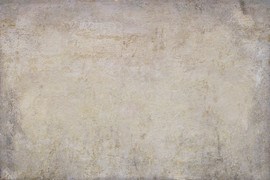 2 Plaster: A paste composed of sand, water, and either lime, gypsum, or cement, which forms a smooth hard surface on walls, ceilings, and other structures upon drying
2 Plaster: A paste composed of sand, water, and either lime, gypsum, or cement, which forms a smooth hard surface on walls, ceilings, and other structures upon drying
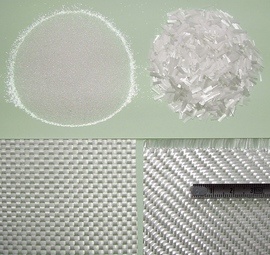 3 Fiberglass: Plastic that is reinforced with glass fibers. The fibers may be mixed randomly throughout the plastic, or come in the form of a flat sheet, or be woven into a fabric
3 Fiberglass: Plastic that is reinforced with glass fibers. The fibers may be mixed randomly throughout the plastic, or come in the form of a flat sheet, or be woven into a fabric
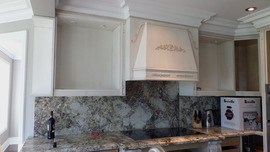 4 Backsplashes: The upright surface, often made of tile, behind a kitchen counter, sink, or stove, that protects the wall from damage from splatter due to kitchen activities
4 Backsplashes: The upright surface, often made of tile, behind a kitchen counter, sink, or stove, that protects the wall from damage from splatter due to kitchen activities
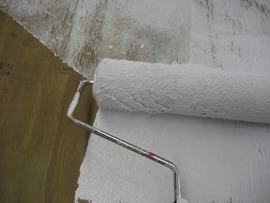 8 Primer: Preparatory coat applied to materials (drywall, wood, metal, etc.) before painting to ensure paint adhesion, extend paint durability, and help seal and protect the surface to be painted
8 Primer: Preparatory coat applied to materials (drywall, wood, metal, etc.) before painting to ensure paint adhesion, extend paint durability, and help seal and protect the surface to be painted
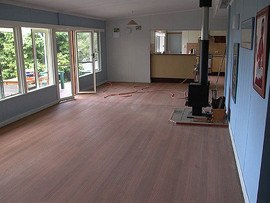 9 Sanded: Process of removing the top surface of a material, such as wood, using sandpaper and/or a specialized sanding machine (for large surface areas)
9 Sanded: Process of removing the top surface of a material, such as wood, using sandpaper and/or a specialized sanding machine (for large surface areas)
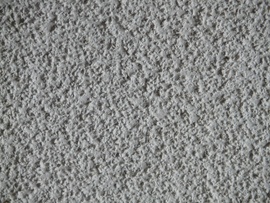 12 Acoustic ceiling: A spray-on or paint-on treatment for the upper interior surface of a room which has a rough curd-like texture and is used to hide imperfections, absorb sound, and reduce echoes
12 Acoustic ceiling: A spray-on or paint-on treatment for the upper interior surface of a room which has a rough curd-like texture and is used to hide imperfections, absorb sound, and reduce echoes
How much does it cost to install drywall in my city?
Cost to install drywall varies greatly by region (and even by zip code). To get free estimates from local contractors, please indicate yours.











